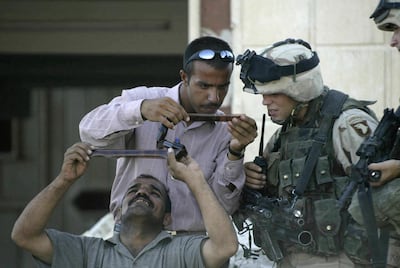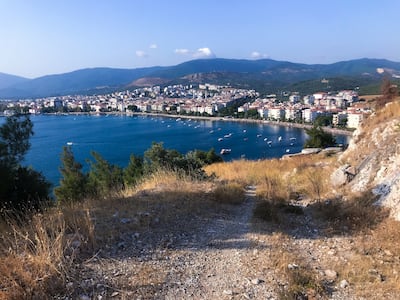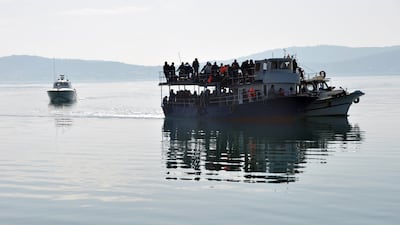Our journalists across the Middle East are lifting the lid on the refugee crisis and its impact. The first two parts of this series can be found here and here
Hussam has been waiting for a long time – twelve years and two months, to be precise.
He never expected to have to live in limbo. But he has fallen between the cracks in a global asylum system that is unable to cater to the tens of millions of people seeking safety worldwide. He is neither able to safely return to his home in Baghdad; nor has he been called for resettlement to a third country. For now, the father of three girls is waiting in Turkey.
“Over this long period of time, my mind has grown tired,” he said. “I’m being patient for the sake of my spirit, and for my children.”
The National interviewed five Iraqis, including Hussam, in the city of Balikesir, a workaday place surrounded by sunflower fields a three-and-a-half hour drive south of Istanbul. All told similar stories of fleeing Iraq under militia threats, and finding themselves stuck in Turkey waiting on drawn-out resettlement applications.
There are nearly 13,000 refugees and another 101,000 asylum seekers from Iraq in Turkey, according to Turkish government figures cited by the UNHCR, the UN’s refugee agency.
The country hosts one of the largest populations of refugees and asylum seekers in the world. As well as the Iraqis, it is home to 3.1 million Syrians, whose official status in the country is as “under temporary protection,” plus tens of thousands of Afghans and Iranians.
After the US-led invasion of Iraq in 2003, Hussam, now 45, and his brother Wissam, now 47, joined the American-backed Iraqi special operations forces – The National is publishing only their first names to protect their identities. Over a period of nine years, they fought alongside US troops in battles against insurgents across the country, from Mosul in the north to Basra in the very south. In memos viewed by The National, US military personnel vouched for Hussam, describing him as, “an extremely professional, loyal and patriotic citizen” who demonstrated, “exceptional leadership, insight and judgment.”
A former US government official who served in Iraq said he believed Hussam’s documents to be genuine. Wissam also confirmed the details of his story.
By May 2012, things were not going well. US forces had left Iraq – they would return in 2014 in counter-ISIS operations. Hussam and Wissam had begun to receive threats from a panoply of militias due to their work with the Americans. A warning note beside the car; a phone call; men in black clothing and a bomb outside the house.
“At the time, I went to my commander and told him ‘Sir, I am getting lots of threats,’” Hussam said. “The commander replied, ‘Hussam, the US forces have left. I am a commander – and I am scared.’”

The brothers booked a plane ticket to the Turkish capital Ankara – Turkey was somewhere that would grant them a visa quickly. They said goodbye to their home.
Hussam registered with the UNHCR and obtained a temporary residency document in Turkey. His ability to move around is limited: to this day, like other refugees in the country, he must apply to Turkish migration officials for a permit every time he wishes to leave Balikesir.
Hussam and Wissam soon applied for US Special Immigration Visas (SIV) – a mechanism under which Washington has provided resettlement for thousands of Iraqis and Afghans whose lives were endangered by their work with Washington. But in 2014 – despite Hussam’s years of work with US forces, and the solid recommendations senior US military officials provided him with – he was denied the SIV. He was technically an employee of the Iraqi Defence Ministry, and not of the US government or a contractor, and therefore was not eligible, according to a document seen by The National.
Wissam obtained an SIV and became a US citizen last year. But he does not understand why he was granted a visa and his brother was not.
“True, we were with the Iraqi government – but our work was joint missions with the US government,” said Wissam over the phone from his new home in a northern state of the USA. “In 2003 and 2004, there was no such thing as the Iraqi government, parliament and Defence Ministry.”
Iraqi refugee in Turkey
Charities say that the SIV programme’s criteria are narrow and there is potential for human error in the extended application bureaucracy.
“There are so many steps in this process where things can go awry – that absolutely does happen,” said Andrew Sullivan, director of advocacy at No One Left Behind, a US charity helping Iraqis and Afghans who worked with US forces.
“And the people that would reprise against him [Hussam] don't really care if he was paid directly by the US, or through the Iraqi ministry where he worked.”
Paying the price
Hussam reapplied for resettlement through the standard UN channel, and in 2017 he was interviewed by the International Catholic Migration Commission (ICMC), which handles resettlement cases from Turkey to the USA. He has been waiting since then.
Hussam’s oldest daughter was 18 months old when the family fled to Turkey. She is now 14, and has two younger sisters, aged 13 and 9. “I don’t want my children to feel that they are living in ghorba – in exile – because I am looking over them,” he said. “But inside, I’m hurting.”
Life in Balikesir is tough. Because his temporary residency document does not allow him to work, Hussam struggles to pay the bills and relies on funds from family abroad. A UNHCR representative said that registered refugees in Turkey can obtain work permits, but none of the Iraqis The National interviewed had received one, amid confusion about their rights in the country.

Life is hard for Hussam’s children, too. His daughters go to school, but their Turkish classmates pick on them, he said.
“When they go to school, the rest of the pupils reject them,” Hussam explained. “They say, ‘You are foreigners, you are this, don't talk to us.’ I calm my girls down. I say to them, ‘Just stay quiet, the important thing is to focus on your studies.’ I don't know what to do.”
Hussam was threatened by militias because of his work with the US army. But the reasons why Iraqis fled to Turkey are many.
Mahmood Al Dulaimi, 46, was working as a radio journalist in Baghdad in August 2013, when militias detained him as he was covering protests demanding better service provision in the Iraqi capital. Then the men came looking for Mahmoud at the radio office – his colleagues warned him to stay away. He applied for a visa to Turkey and left Iraq.
He has never been back, but nor has he been able to move on. An ICMC panel interviewed him for relocation to the USA in 2018 – like other refugees interviewed, he did not choose the resettlement destination. He has been waiting since then.
“It’s as if we are dead here,” he said, sitting in his cramped basement apartment in Balikesir. “Twelve years of my life are gone.”
Despite the time that has gone by, Mahmoud has never integrated into Turkish society. Anti-immigrant sentiment has grown in the country as unorthodox economic policies have caused inflation to rise, and squeezed Turks’ quality of living.
“I never mix with them. I only have one Turkish friend, he is from Urfa and speaks Arabic,” Mahmoud said, referring to an ethnically-mixed city on Turkey’s border with Syria. “I have a Turkish friend who lives in Germany, he comes every year for two or three months. Other than that I don’t have any Turkish friends. They talk to us using indecent words: ‘Why don’t you go back to your country?’ ‘Why are you here?’”
He is visibly frustrated at the formulaic email responses he receives from the ICMC, responsible for liaising between applicants for resettlement, the UNHCR, and US authorities. They tell him that his application has not been lost or forgotten, but that it is still undergoing checks and processing.
The ICMC did not respond to a request for comment.
A UNHCR Turkey representative said that resettlement is not a right, and is a long process: “It may take months, sometimes years, depending on the resettlement countries and their assessment and reception procedures, which include finding suitable accommodation for refugees upon arrival in their resettlement country.”
More than 16,800 resettlement submissions were made in Turkey in 2023, and over 13,900 departed, the representative added.
A US State Department representative said that the country welcomed more than 60,000 refugees from around the world last year, the highest level since 2016.
“The US Refugee Admissions Programme has made significant progress in reducing the backlog – i.e., individuals with cases referred to the programme before 2018,” the representative said.
But people like Mahmood and Hussam feel forgotten.
“I served my country and worked with the US forces,” Hussam said. “Is this my punishment?”


